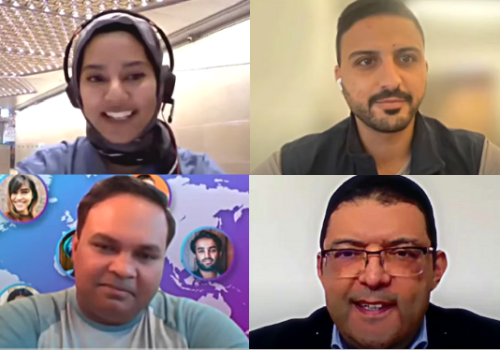From crypto winter to crypto spring: The challenges and opportunities of cryptocurrency in MENA
On June 28, the Atlantic Council’s empowerME Initiative, in partnership with ABANA, convened a virtual event to discuss the risks, challenges, and opportunities of the cryptocurrency landscape in the Middle East and North Africa (MENA), as well as the impacts of the recent cryptocurrency crashes. The event featured opening remarks by seriesOne FinTech Investment Banking Specialist in Blockchain & DeFi Protocols Anthony Hussain and closing remarks by Atlantic Council empowerME Initiative Director Racha Helwa. Atlantic Council Senior Advisor to the President and CEO & Nonresident Senior Fellow Michael Greenwald moderated a panel discussion featuring Circle CSO & Head of Global Policy Dante Disparte; MidChains COO Craig Lund; and Oliver Wyman Financial Services Partner Gokce Ozcan.
This was the fourth and final webinar in a joint series to shed light on the changing financial technology (Fintech) landscape in the MENA region, identify challenges and opportunities, and explore policy recommendations.
The key points from the discussion are summarized below.
Challenges in the current cryptocurrency landscape:
- Dante Disparte emphasized that “not all digital assets are created equally.” While the convergence between traditional forms of banking and technology presents many growth opportunities for economic actors in the region, governments and central banks in MENA must attract responsible actors and deflect bad actors in in order to “leapfrog traditional business models and start anchoring business models of the future.”
- Craig Lund cautioned that unregulated platforms are posting faulty coins without any proper due diligence simply to generate transactions. As a result, he expects to see a push from firms to regulate their platforms to avoid recourse. It will be critical to balance the removal of bad actors without overregulating platforms and reducing optionality for consumers.
- Gokce Ozcan highlighted that the recent volatility in cryptocurrency markets has caused a great deal of concern across MENA. While regional governments are questioning their commitments and investments in digital assets, Ozcan argued that the downturn is actually “an opportunity for the region to differentiate the good from the bad,” and adjust current policies accordingly. Disparte agreed and quoted the Bank of England’s Sir Jon Cunliffe, saying the companies that survive the current crypto correction will “be the Amazons of the future.”
Humanitarian implications of digital currencies:
- Ozcan pointed out that this technology is being used for the betterment of society, specifically in reference to human rights. For example, in the wake of global conflicts, NFTs can be used as a means for advancing humanitarian aid and human rights rather than simply turning a profit.
Opportunities for cryptocurrency:
- Disparte explained that innovative digital financial services are rewriting the traditional development playbook in MENA, especially in countries such as Egypt, where a large percentage of the population is on the margins of the formal economy. By tapping into diaspora populations for low interest payments and providing digital wallets to thousands of individuals across the globe, a new era of financial mobility is upon us.
- Disparte underscored Israel’s experimentation with Ethereum as an example of the bridge that digital currency can serve between conservative government institutions and technological innovation. By incorporating cryptocurrencies into its central bank, Israel has developed “transparent networks that are designed to enhance financial crime compliance.” He explained that enabling these types of networks throughout MENA can result in “exponential gains in financial inclusion and integrity.”
- Lund stressed that, through a combination of regulatory frameworks and the empowerment of freezone financial centers, the UAE has opened its doors to new businesses and diversified its technology sector. Lund highlighted license exchange programs as critical measures in turning an unregulated industry into a regulatory one, engaging “global players coming into the region seeking to work with other regulatory bodies and freezones.”
- Lund articulated that there is hope in the region to create a better future through economic growth and innovation. Ozcan concurred, calling the region’s genuine interest in innovation and being a leader in the cryptocurrency market its “greatest asset.”
Recommendations for stakeholders:
- Disparte argued that “historically, the regulatory and policy conversation about cryptocurrency has been fear-based and risk-based, as opposed to enablement-based.” He advised governments, civil society, and private industry stakeholders to take deliberate action together rooted in this new framework. MENA governments could consider following the Abu Dhabi model: develop a strategy unique to your region, capitalize upon your distinct advantages in terms of talent and opportunity, and “emerge as beacon in a sea of regulatory uncertainty and policy uncertainty.”
- Ozcan contended that cryptocurrencies can be leveraged by politically turbulent countries to better integrate themselves with global markets. In this sense, countries that commit to building technologies from the onset are more likely to reap greater returns than if they were to wait for “more traditional institutional capabilities to be built.” In Ozcan’s view, cryptocurrency serves as the great equalizer in international finance, promising market inclusion for countries willing to make the investment.
Alexandra Kaiss is a Young Global Professional with the Middle East Programs at the Atlantic Council. Follow her @alexandrakaiss.
Further reading
Fri, Oct 29, 2021
FinTech in MENA: How to build an ecosystem that promotes innovation and regulation
Event Recap By Stefanie Hausheer Ali
The Atlantic Council’s empowerME Initiative in partnership with ABANA is convening a virtual event series to shed light on the changing FinTech landscape in the MENA region, identify challenges and opportunities, and explore policy recommendations.
Mon, Dec 20, 2021
Fintech innovation is critical for business and women in MENA
Event Recap By
On December 14, the Atlantic Council’s empowerME Initiative held a virtual event on “MENA’s Fintech innovators: Digitizing financial services” in partnership with ABANA.
Thu, Mar 10, 2022
Fintech is opening new doors in MENA for inclusive finance
MENASource By Allison Holle
On March 1, the Atlantic Council’s empowerME Initiative, in partnership with ABANA, held a virtual event to discuss the opportunities for inclusive finance that the financial technology (Fintech) sector presents to the Middle East and North Africa’s (MENA) population.


